2012.06.DD - Guitarist Magazine - Interview with Slash
Page 1 of 1
 2012.06.DD - Guitarist Magazine - Interview with Slash
2012.06.DD - Guitarist Magazine - Interview with Slash
Thanks to @Surge for sending us this article!


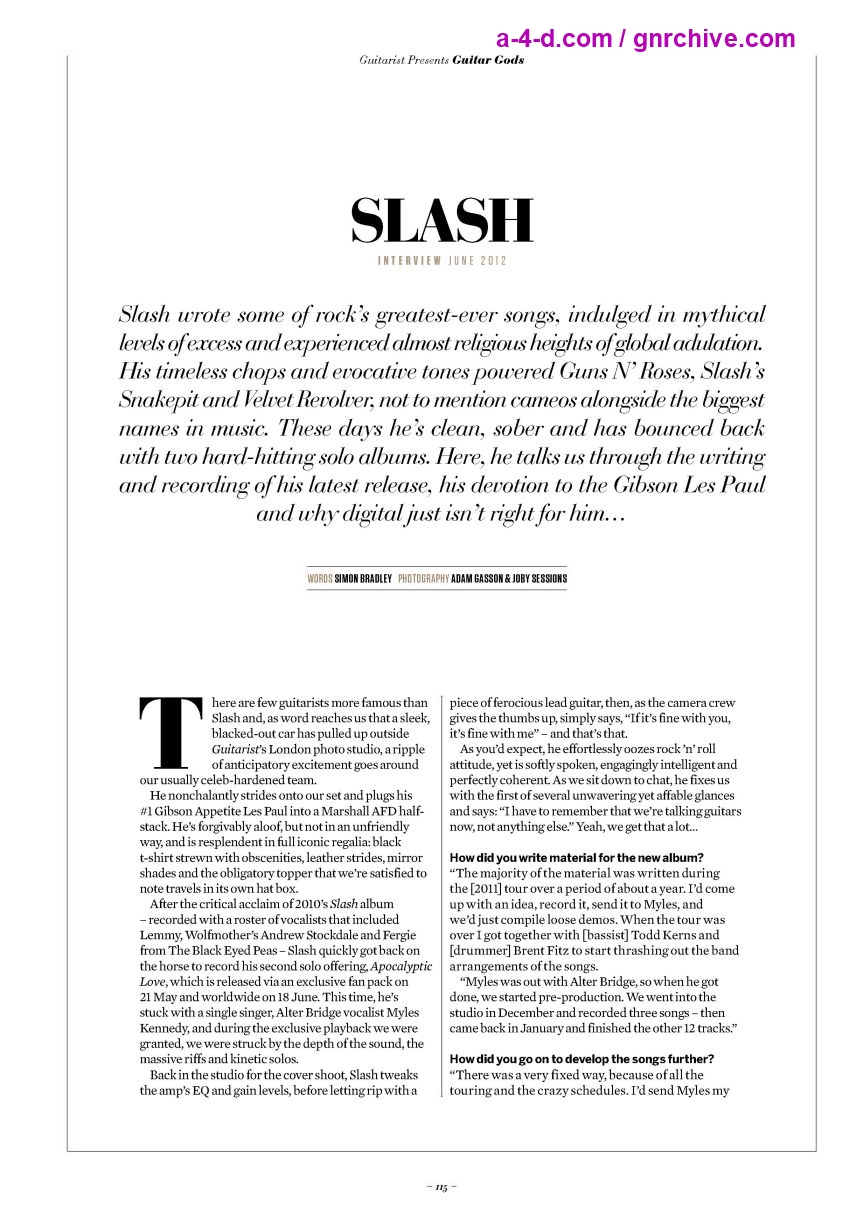
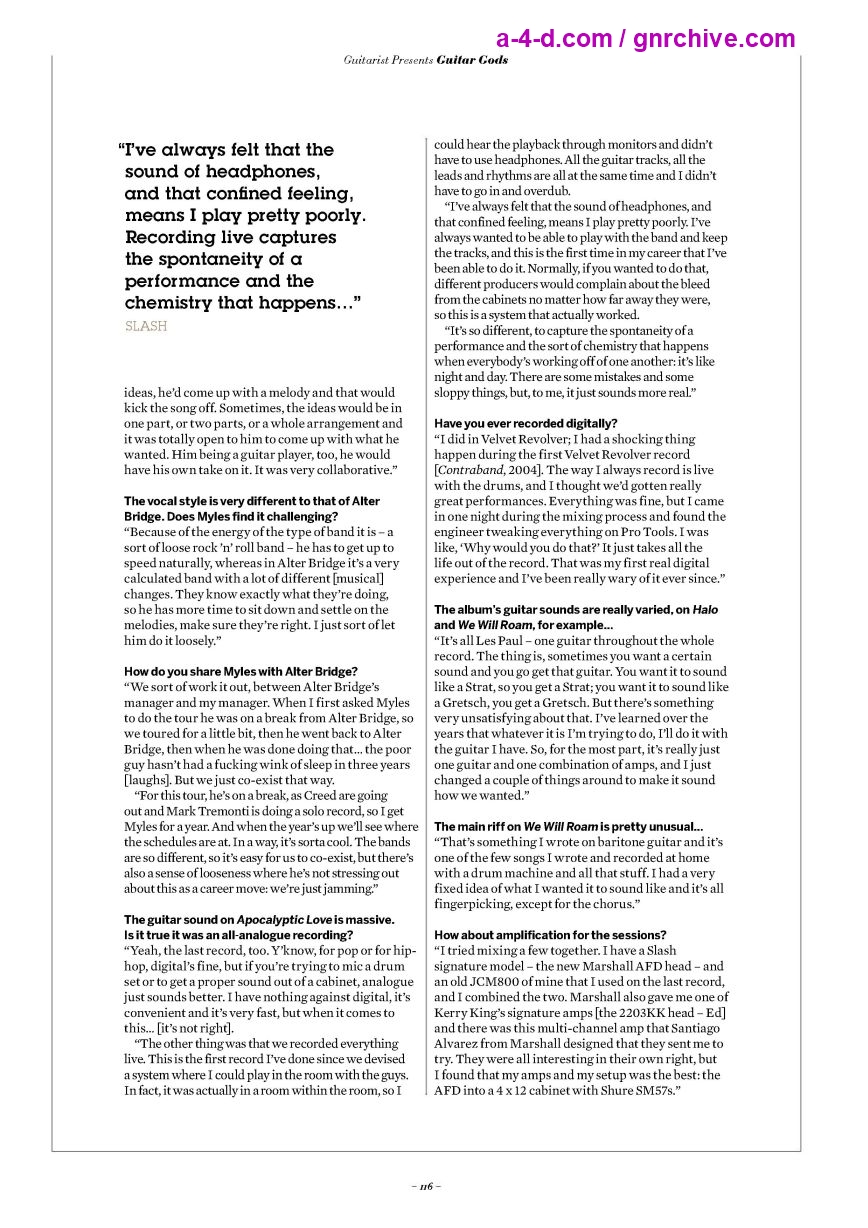
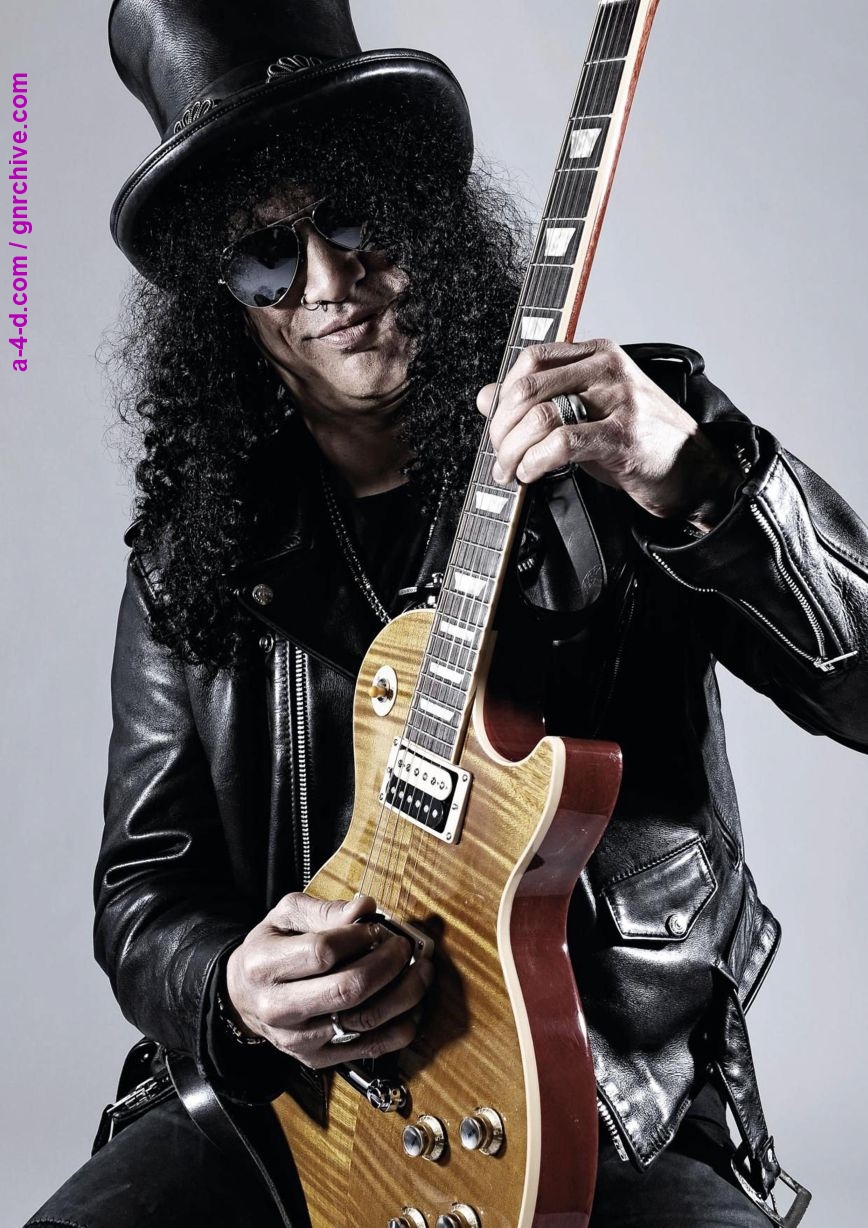
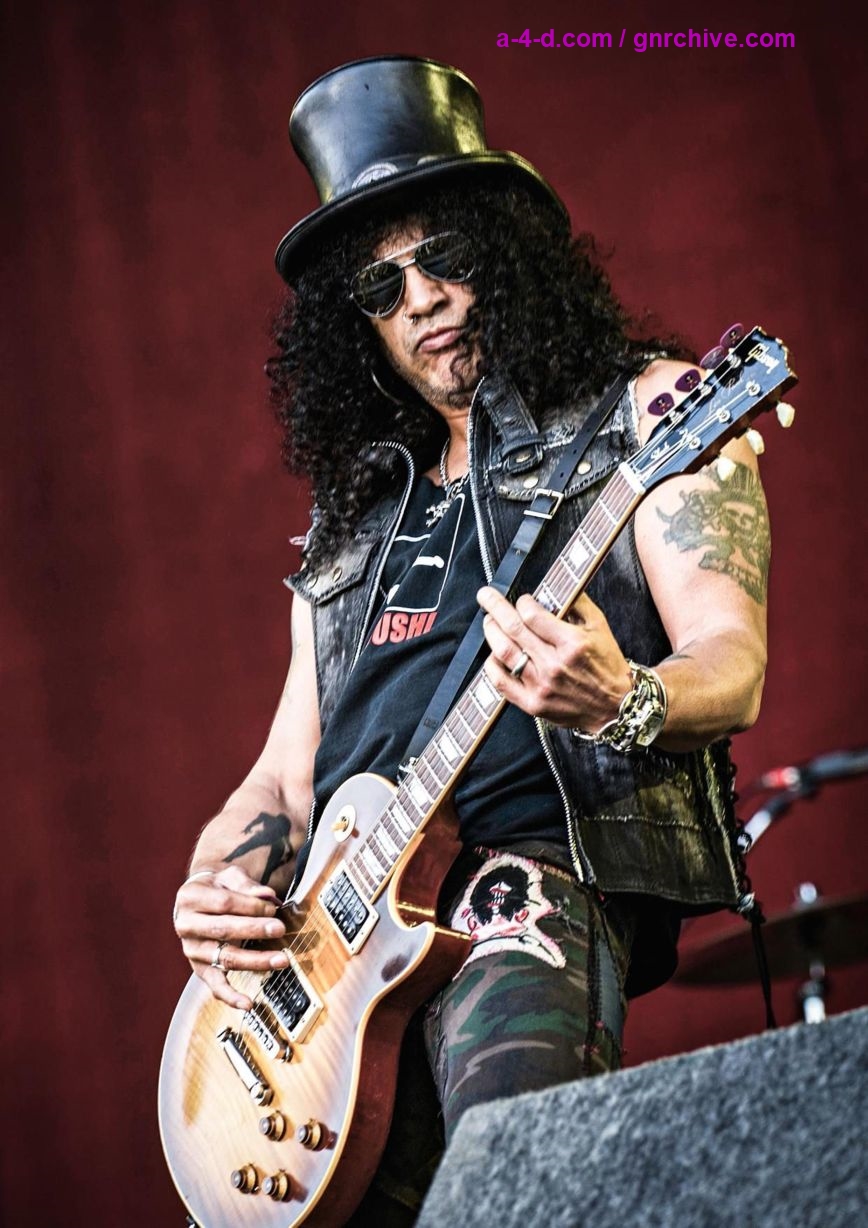
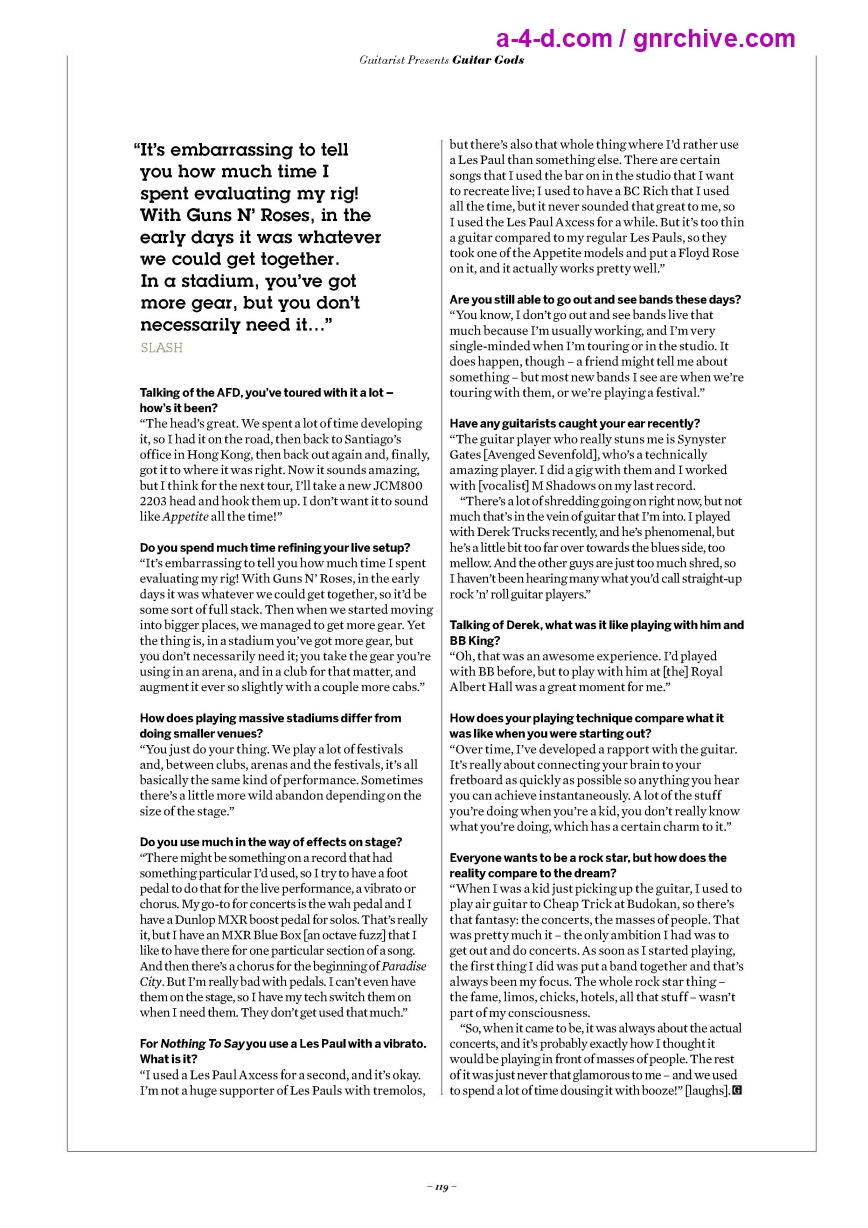
SLASH
INTERVIEW JUNE 2012
Slash wrote some of rock’s greatest-ever songs, indulged in mythical levels of excess and experienced almost religious heights of global adulation. His timeless chops and evocative tones powered Guns N' Roses, Slash’ Snakepit and Velvet Revolver, not to mention cameos alongside the biggest names in music. These days he's clean, sober and has bounced back with two hard-hitting solo albums. Here, he talks us through the writing and recording of his latest release, his devotion to the Gibson Les Paul and why digital just isn’t right for him...
WORDS SIMON BRADLEY
PHOTOGRAPHY ADAM GASSON & JOBY SESSIONS
There are few guitarists more famous than Slash and, as word reaches us that a sleek, blacked-out car has pulled up outside Guitarist's London photo studio, a ripple of anticipatory excitement goes around our usually celeb-hardened team.
He nonchalantly strides onto our set and plugs his #1 Gibson Appetite Les Paul into a Marshall AFD halfstack. He’s forgivably aloof, but not in an unfriendly way, and is resplendent in full iconic regalia: black t-shirt strewn with obscenities, leather strides, mirror shades and the obligatory topper that we’re satisfied to note travels in its own hat box.
After the critical acclaim of 2010’s Slash album - recorded with a roster of vocalists that included Lemmy, Wolfmother’s Andrew Stockdale and Fergie from The Black Eyed Peas - Slash quickly got back on the horse to record his second solo offering, Apocalyptic Love, which is released via an exclusive fan pack on 21 May and worldwide on 18 June. This time, he’s stuck with a single singer, Alter Bridge vocalist Myles Kennedy, and during the exclusive playback we were granted, we were struck by the depth of the sound, the massive riffs and kinetic solos.
Back in the studio for the cover shoot, Slash tweaks the amp’s EQ and gain levels, before letting rip with a piece of ferocious lead guitar, then, as the camera crew gives the thumbs up, simply says, “If it’s fine with you, it’s fine with me” - and that’s that.
As you’d expect, he effortlessly oozes rock ’n’ roll attitude, yet is softly spoken, engagingly intelligent and perfectly coherent. As we sit down to chat, he fixes us with the first of several unwavering yet affable glances and says: “I have to remember that we’re talking guitars now, not anything else.” Yeah, we get that a lot...
How did you write material for the new album?
“The majority of the material was written during the [2011] tour over a period of about a year. I’d come up with an idea, record it, send it to Myles, and we’d just compile loose demos. When the tour was over I got together with [bassist] Todd Kerns and [drummer] Brent Fitz to start thrashing out the band arrangements of the songs.
“Myles was out with Alter Bridge, so when he got done, we started pre-production. We went into the studio in December and recorded three songs - then came back in January and finished the other 12 tracks.”
How did you go on to develop the songs further?
“There was a very fixed way, because of all the touring and the crazy schedules. I’d send Myles my ideas, he’d come up with a melody and that would kick the song off. Sometimes, the ideas would be in one part, or two parts, or a whole arrangement and it was totally open to him to come up with what he wanted. Him being a guitar player, too, he would have his own take on it. It was very collaborative.”
The vocal style is very different to that of Alter Bridge. Does Myles find it challenging?
“Because of the energy of the type of band it is - a sort of loose rock ’n’ roll band - he has to get up to speed naturally, whereas in Alter Bridge it’s a very calculated band with a lot of different [musical] changes. They know exactly what they’re doing, so he has more time to sit down and settle on the melodies, make sure they’re right. I just sort of let him do it loosely.”
How do you share Myles with Alter Bridge?
“We sort of work it out, between Alter Bridge’s manager and my manager. When I first asked Myles to do the tour he was on a break from Alter Bridge, so we toured for a little bit, then he went back to Alter Bridge, then when he was done doing that... the poor guy hasn’t had a fucking wink of sleep in three years [laughs]. But we just co-exist that way.
“For this tour, he’s on a break, as Creed are going out and Mark Tremonti is doing a solo record, so I get Myles for a year. And when the year’s up we’ll see where the schedules are at. In a way, it’s sorta cool. The bands are so different, so it’s easy for us to co-exist, but there’s also a sense of looseness where he’s not stressing out about this as a career move: we’re just jamming.”
The guitar sound on Apocalyptic Love is massive. Is it true it was an all-analogue recording?
“Yeah, the last record, too. Y’know, for pop or for hip-hop, digital’s fine, but if you’re trying to mic a drum set or to get a proper sound out of a cabinet, analogue just sounds better. I have nothing against digital, it’s convenient and it’s very fast, but when it comes to this. [it’s not right].
“The other thing was that we recorded everything live. This is the first record I’ve done since we devised a system where I could play in the room with the guys. In fact, it was actually in a room within the room, so I could hear the playback through monitors and didn’t have to use headphones. All the guitar tracks, all the leads and rhythms are all at the same time and I didn’t have to go in and overdub.
“I’ve always felt that the sound of headphones, and that confined feeling, means I play pretty poorly. I’ve always wanted to be able to play with the band and keep the tracks, and this is the first time in my career that I’ve been able to do it. Normally, if you wanted to do that, different producers would complain about the bleed from the cabinets no matter how far away they were, so this is a system that actually worked.
“It’s so different, to capture the spontaneity of a performance and the sort of chemistry that happens when everybody’s working off of one another: it’s like night and day. There are some mistakes and some sloppy things, but, to me, it just sounds more real.”
Have you ever recorded digitally?
“I did in Velvet Revolver; I had a shocking thing happen during the first Velvet Revolver record [Contraband, 2004]. The way I always record is live with the drums, and I thought we’d gotten really great performances. Everything was fine, but I came in one night during the mixing process and found the engineer tweaking everything on Pro Tools. I was like, ‘Why would you do that?’ It just takes all the life out of the record. That was my first real digital experience and I’ve been really wary of it ever since.”
The album’s guitar sounds are really varied, on Halo and We Will Roam, for example.
“It’s all Les Paul - one guitar throughout the whole record. The thing is, sometimes you want a certain sound and you go get that guitar. You want it to sound like a Strat, so you get a Strat; you want it to sound like a Gretsch, you get a Gretsch. But there’s something very unsatisfying about that. I’ve learned over the years that whatever it is I’m trying to do, I’ll do it with the guitar I have. So, for the most part, it’s really just one guitar and one combination of amps, and I just changed a couple of things around to make it sound how we wanted.”
The main riff on We Will Roam is pretty unusual
“That’s something I wrote on baritone guitar and it’s one of the few songs I wrote and recorded at home with a drum machine and all that stuff. I had a very fixed idea of what I wanted it to sound like and it’s all fingerpicking, except for the chorus.”
How about amplification for the sessions?
“I tried mixing a few together. I have a Slash signature model - the new Marshall AFD head - and an old JCM800 of mine that I used on the last record, and I combined the two. Marshall also gave me one of Kerry King’s signature amps [the 2203KK head - Ed] and there was this multi-channel amp that Santiago Alvarez from Marshall designed that they sent me to try. They were all interesting in their own right, but I found that my amps and my setup was the best: the AFD into a 4 x 12 cabinet with Shure SM57s.”
Talking of the AFD, you’ve toured with it a lot -how’s it been?
“The head’s great. We spent a lot of time developing it, so I had it on the road, then back to Santiago’s office in Hong Kong, then back out again and, finally, got it to where it was right. Now it sounds amazing, but I think for the next tour, I’ll take a new JCM800 2203 head and hook them up. I don’t want it to sound like Appetite all the time!”
Do you spend much time refining your live setup?
“It’s embarrassing to tell you how much time I spent evaluating my rig! With Guns N’ Roses, in the early days it was whatever we could get together, so it’d be some sort of full stack. Then when we started moving into bigger places, we managed to get more gear. Yet the thing is, in a stadium you’ve got more gear, but you don’t necessarily need it; you take the gear you’re using in an arena, and in a club for that matter, and augment it ever so slightly with a couple more cabs.”
How does playing massive stadiums differ from doing smaller venues?
“You just do your thing. We play a lot of festivals and, between clubs, arenas and the festivals, it’s all basically the same kind of performance. Sometimes there’s a little more wild abandon depending on the size of the stage.”
Do you use much in the way of effects on stage?
“There might be something on a record that had something particular I’d used, so I try to have a foot pedal to do that for the live performance, a vibrato or chorus. My go-to for concerts is the wah pedal and I have a Dunlop MXR boost pedal for solos. That’s really it, but I have an MXR Blue Box [an octave fuzz] that I like to have there for one particular section of a song. And then there’s a chorus for the beginning of Paradise City. But I’m really bad with pedals. I can’t even have them on the stage, so I have my tech switch them on when I need them. They don’t get used that much.”
For Nothing To Say you use a Les Paul with a vibrato. What is it?
“I used a Les Paul Axcess for a second, and it’s okay. I’m not a huge supporter of Les Pauls with tremolos, but there’s also that whole thing where I’d rather use a Les Paul than something else. There are certain songs that I used the bar on in the studio that I want to recreate live; I used to have a BC Rich that I used all the time, but it never sounded that great to me, so I used the Les Paul Axcess for a while. But it’s too thin a guitar compared to my regular Les Pauls, so they took one of the Appetite models and put a Floyd Rose on it, and it actually works pretty well.”
Are you still able to go out and see bands these days?
“You know, I don’t go out and see bands live that much because I’m usually working, and I’m very single-minded when I’m touring or in the studio. It does happen, though - a friend might tell me about something - but most new bands I see are when we’re touring with them, or we’re playing a festival.”
Have any guitarists caught your ear recently?
“The guitar player who really stuns me is Synyster Gates [Avenged Sevenfold], who’s a technically amazing player. I did a gig with them and I worked with [vocalist] M Shadows on my last record.
“There’s a lot of shredding going on right now, but not much that’s in the vein of guitar that I’m into. I played with Derek Trucks recently, and he’s phenomenal, but he’s a little bit too far over towards the blues side, too mellow. And the other guys are just too much shred, so I haven’t been hearing many what you’d call straight-up rock ’n’ roll guitar players.”
Talking of Derek, what was it like playing with him and BB King?
“Oh, that was an awesome experience. I’d played with BB before, but to play with him at [the] Royal Albert Hall was a great moment for me.”
How does your playing technique compare what it was like when you were starting out?
“Over time, I’ve developed a rapport with the guitar. It’s really about connecting your brain to your fretboard as quickly as possible so anything you hear you can achieve instantaneously. A lot of the stuff you’re doing when you’re a kid, you don’t really know what you’re doing, which has a certain charm to it.”
Everyone wants to be a rock star, but how does the reality compare to the dream?
“When I was a kid just picking up the guitar, I used to play air guitar to Cheap Trick at Budokan, so there’s that fantasy: the concerts, the masses of people. That was pretty much it - the only ambition I had was to get out and do concerts. As soon as I started playing, the first thing I did was put a band together and that’s always been my focus. The whole rock star thing -the fame, limos, chicks, hotels, all that stuff - wasn’t part of my consciousness.
“So, when it came to be, it was always about the actual concerts, and it’s probably exactly how I thought it would be playing in front of masses of people. The rest of it was just never that glamorous to me - and we used to spend a lot of time dousing it with booze!” [laughs].







SLASH
INTERVIEW JUNE 2012
Slash wrote some of rock’s greatest-ever songs, indulged in mythical levels of excess and experienced almost religious heights of global adulation. His timeless chops and evocative tones powered Guns N' Roses, Slash’ Snakepit and Velvet Revolver, not to mention cameos alongside the biggest names in music. These days he's clean, sober and has bounced back with two hard-hitting solo albums. Here, he talks us through the writing and recording of his latest release, his devotion to the Gibson Les Paul and why digital just isn’t right for him...
WORDS SIMON BRADLEY
PHOTOGRAPHY ADAM GASSON & JOBY SESSIONS
There are few guitarists more famous than Slash and, as word reaches us that a sleek, blacked-out car has pulled up outside Guitarist's London photo studio, a ripple of anticipatory excitement goes around our usually celeb-hardened team.
He nonchalantly strides onto our set and plugs his #1 Gibson Appetite Les Paul into a Marshall AFD halfstack. He’s forgivably aloof, but not in an unfriendly way, and is resplendent in full iconic regalia: black t-shirt strewn with obscenities, leather strides, mirror shades and the obligatory topper that we’re satisfied to note travels in its own hat box.
After the critical acclaim of 2010’s Slash album - recorded with a roster of vocalists that included Lemmy, Wolfmother’s Andrew Stockdale and Fergie from The Black Eyed Peas - Slash quickly got back on the horse to record his second solo offering, Apocalyptic Love, which is released via an exclusive fan pack on 21 May and worldwide on 18 June. This time, he’s stuck with a single singer, Alter Bridge vocalist Myles Kennedy, and during the exclusive playback we were granted, we were struck by the depth of the sound, the massive riffs and kinetic solos.
Back in the studio for the cover shoot, Slash tweaks the amp’s EQ and gain levels, before letting rip with a piece of ferocious lead guitar, then, as the camera crew gives the thumbs up, simply says, “If it’s fine with you, it’s fine with me” - and that’s that.
As you’d expect, he effortlessly oozes rock ’n’ roll attitude, yet is softly spoken, engagingly intelligent and perfectly coherent. As we sit down to chat, he fixes us with the first of several unwavering yet affable glances and says: “I have to remember that we’re talking guitars now, not anything else.” Yeah, we get that a lot...
How did you write material for the new album?
“The majority of the material was written during the [2011] tour over a period of about a year. I’d come up with an idea, record it, send it to Myles, and we’d just compile loose demos. When the tour was over I got together with [bassist] Todd Kerns and [drummer] Brent Fitz to start thrashing out the band arrangements of the songs.
“Myles was out with Alter Bridge, so when he got done, we started pre-production. We went into the studio in December and recorded three songs - then came back in January and finished the other 12 tracks.”
How did you go on to develop the songs further?
“There was a very fixed way, because of all the touring and the crazy schedules. I’d send Myles my ideas, he’d come up with a melody and that would kick the song off. Sometimes, the ideas would be in one part, or two parts, or a whole arrangement and it was totally open to him to come up with what he wanted. Him being a guitar player, too, he would have his own take on it. It was very collaborative.”
The vocal style is very different to that of Alter Bridge. Does Myles find it challenging?
“Because of the energy of the type of band it is - a sort of loose rock ’n’ roll band - he has to get up to speed naturally, whereas in Alter Bridge it’s a very calculated band with a lot of different [musical] changes. They know exactly what they’re doing, so he has more time to sit down and settle on the melodies, make sure they’re right. I just sort of let him do it loosely.”
How do you share Myles with Alter Bridge?
“We sort of work it out, between Alter Bridge’s manager and my manager. When I first asked Myles to do the tour he was on a break from Alter Bridge, so we toured for a little bit, then he went back to Alter Bridge, then when he was done doing that... the poor guy hasn’t had a fucking wink of sleep in three years [laughs]. But we just co-exist that way.
“For this tour, he’s on a break, as Creed are going out and Mark Tremonti is doing a solo record, so I get Myles for a year. And when the year’s up we’ll see where the schedules are at. In a way, it’s sorta cool. The bands are so different, so it’s easy for us to co-exist, but there’s also a sense of looseness where he’s not stressing out about this as a career move: we’re just jamming.”
The guitar sound on Apocalyptic Love is massive. Is it true it was an all-analogue recording?
“Yeah, the last record, too. Y’know, for pop or for hip-hop, digital’s fine, but if you’re trying to mic a drum set or to get a proper sound out of a cabinet, analogue just sounds better. I have nothing against digital, it’s convenient and it’s very fast, but when it comes to this. [it’s not right].
“The other thing was that we recorded everything live. This is the first record I’ve done since we devised a system where I could play in the room with the guys. In fact, it was actually in a room within the room, so I could hear the playback through monitors and didn’t have to use headphones. All the guitar tracks, all the leads and rhythms are all at the same time and I didn’t have to go in and overdub.
“I’ve always felt that the sound of headphones, and that confined feeling, means I play pretty poorly. I’ve always wanted to be able to play with the band and keep the tracks, and this is the first time in my career that I’ve been able to do it. Normally, if you wanted to do that, different producers would complain about the bleed from the cabinets no matter how far away they were, so this is a system that actually worked.
“It’s so different, to capture the spontaneity of a performance and the sort of chemistry that happens when everybody’s working off of one another: it’s like night and day. There are some mistakes and some sloppy things, but, to me, it just sounds more real.”
Have you ever recorded digitally?
“I did in Velvet Revolver; I had a shocking thing happen during the first Velvet Revolver record [Contraband, 2004]. The way I always record is live with the drums, and I thought we’d gotten really great performances. Everything was fine, but I came in one night during the mixing process and found the engineer tweaking everything on Pro Tools. I was like, ‘Why would you do that?’ It just takes all the life out of the record. That was my first real digital experience and I’ve been really wary of it ever since.”
The album’s guitar sounds are really varied, on Halo and We Will Roam, for example.
“It’s all Les Paul - one guitar throughout the whole record. The thing is, sometimes you want a certain sound and you go get that guitar. You want it to sound like a Strat, so you get a Strat; you want it to sound like a Gretsch, you get a Gretsch. But there’s something very unsatisfying about that. I’ve learned over the years that whatever it is I’m trying to do, I’ll do it with the guitar I have. So, for the most part, it’s really just one guitar and one combination of amps, and I just changed a couple of things around to make it sound how we wanted.”
The main riff on We Will Roam is pretty unusual
“That’s something I wrote on baritone guitar and it’s one of the few songs I wrote and recorded at home with a drum machine and all that stuff. I had a very fixed idea of what I wanted it to sound like and it’s all fingerpicking, except for the chorus.”
How about amplification for the sessions?
“I tried mixing a few together. I have a Slash signature model - the new Marshall AFD head - and an old JCM800 of mine that I used on the last record, and I combined the two. Marshall also gave me one of Kerry King’s signature amps [the 2203KK head - Ed] and there was this multi-channel amp that Santiago Alvarez from Marshall designed that they sent me to try. They were all interesting in their own right, but I found that my amps and my setup was the best: the AFD into a 4 x 12 cabinet with Shure SM57s.”
Talking of the AFD, you’ve toured with it a lot -how’s it been?
“The head’s great. We spent a lot of time developing it, so I had it on the road, then back to Santiago’s office in Hong Kong, then back out again and, finally, got it to where it was right. Now it sounds amazing, but I think for the next tour, I’ll take a new JCM800 2203 head and hook them up. I don’t want it to sound like Appetite all the time!”
Do you spend much time refining your live setup?
“It’s embarrassing to tell you how much time I spent evaluating my rig! With Guns N’ Roses, in the early days it was whatever we could get together, so it’d be some sort of full stack. Then when we started moving into bigger places, we managed to get more gear. Yet the thing is, in a stadium you’ve got more gear, but you don’t necessarily need it; you take the gear you’re using in an arena, and in a club for that matter, and augment it ever so slightly with a couple more cabs.”
How does playing massive stadiums differ from doing smaller venues?
“You just do your thing. We play a lot of festivals and, between clubs, arenas and the festivals, it’s all basically the same kind of performance. Sometimes there’s a little more wild abandon depending on the size of the stage.”
Do you use much in the way of effects on stage?
“There might be something on a record that had something particular I’d used, so I try to have a foot pedal to do that for the live performance, a vibrato or chorus. My go-to for concerts is the wah pedal and I have a Dunlop MXR boost pedal for solos. That’s really it, but I have an MXR Blue Box [an octave fuzz] that I like to have there for one particular section of a song. And then there’s a chorus for the beginning of Paradise City. But I’m really bad with pedals. I can’t even have them on the stage, so I have my tech switch them on when I need them. They don’t get used that much.”
For Nothing To Say you use a Les Paul with a vibrato. What is it?
“I used a Les Paul Axcess for a second, and it’s okay. I’m not a huge supporter of Les Pauls with tremolos, but there’s also that whole thing where I’d rather use a Les Paul than something else. There are certain songs that I used the bar on in the studio that I want to recreate live; I used to have a BC Rich that I used all the time, but it never sounded that great to me, so I used the Les Paul Axcess for a while. But it’s too thin a guitar compared to my regular Les Pauls, so they took one of the Appetite models and put a Floyd Rose on it, and it actually works pretty well.”
Are you still able to go out and see bands these days?
“You know, I don’t go out and see bands live that much because I’m usually working, and I’m very single-minded when I’m touring or in the studio. It does happen, though - a friend might tell me about something - but most new bands I see are when we’re touring with them, or we’re playing a festival.”
Have any guitarists caught your ear recently?
“The guitar player who really stuns me is Synyster Gates [Avenged Sevenfold], who’s a technically amazing player. I did a gig with them and I worked with [vocalist] M Shadows on my last record.
“There’s a lot of shredding going on right now, but not much that’s in the vein of guitar that I’m into. I played with Derek Trucks recently, and he’s phenomenal, but he’s a little bit too far over towards the blues side, too mellow. And the other guys are just too much shred, so I haven’t been hearing many what you’d call straight-up rock ’n’ roll guitar players.”
Talking of Derek, what was it like playing with him and BB King?
“Oh, that was an awesome experience. I’d played with BB before, but to play with him at [the] Royal Albert Hall was a great moment for me.”
How does your playing technique compare what it was like when you were starting out?
“Over time, I’ve developed a rapport with the guitar. It’s really about connecting your brain to your fretboard as quickly as possible so anything you hear you can achieve instantaneously. A lot of the stuff you’re doing when you’re a kid, you don’t really know what you’re doing, which has a certain charm to it.”
Everyone wants to be a rock star, but how does the reality compare to the dream?
“When I was a kid just picking up the guitar, I used to play air guitar to Cheap Trick at Budokan, so there’s that fantasy: the concerts, the masses of people. That was pretty much it - the only ambition I had was to get out and do concerts. As soon as I started playing, the first thing I did was put a band together and that’s always been my focus. The whole rock star thing -the fame, limos, chicks, hotels, all that stuff - wasn’t part of my consciousness.
“So, when it came to be, it was always about the actual concerts, and it’s probably exactly how I thought it would be playing in front of masses of people. The rest of it was just never that glamorous to me - and we used to spend a lot of time dousing it with booze!” [laughs].

Blackstar- ADMIN
- Posts : 13875
Plectra : 91078
Reputation : 101
Join date : 2018-03-17
 Similar topics
Similar topics» 2001.04.DD - Guitarist Magazine - Interview with Slash
» 2012.07.DD - Guitar Interactive Magazine - Interview with Slash
» 2012.05.18 - Rock Hard Magazine - Video interview with Slash
» 1992.07.DD - Guitarist Magazine - Gun Law (Slash)
» 2005.03.DD - Guitarist Magazine - The World According to Slash
» 2012.07.DD - Guitar Interactive Magazine - Interview with Slash
» 2012.05.18 - Rock Hard Magazine - Video interview with Slash
» 1992.07.DD - Guitarist Magazine - Gun Law (Slash)
» 2005.03.DD - Guitarist Magazine - The World According to Slash
Page 1 of 1
Permissions in this forum:
You cannot reply to topics in this forum|
|
|

